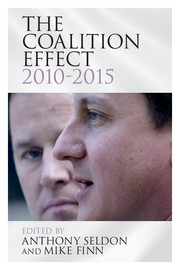Book contents
- Frontmatter
- Contents
- Contributors
- Acknowledgements
- David Cameron as Prime Minister, 2010–2015: The verdict of history
- Part I The coalition and the government of Britain
- Part II The coalition and policy
- 6 The coalition and the economy
- 7 The coalition and energy policy
- 8 The coalition and infrastructure
- 9 The coalition and society (I): Home affairs and local government
- 10 The coalition and society (II): Education
- 11 The coalition and society (III): Health and long-term care
- 12 The coalition and society (IV): Welfare
- 13 The coalition and foreign affairs
- 14 Europe: The coalition's poisoned chalice
- 15 ‘What the coalition did for women’: A new gender consensus, coalition division and gendered austerity
- 16 The coalition and culture: ‘Bread, circuses and Britishness’
- Part III The coalition and political culture
- Part IV Conclusion
- Index
10 - The coalition and society (II): Education
Published online by Cambridge University Press: 05 April 2015
- Frontmatter
- Contents
- Contributors
- Acknowledgements
- David Cameron as Prime Minister, 2010–2015: The verdict of history
- Part I The coalition and the government of Britain
- Part II The coalition and policy
- 6 The coalition and the economy
- 7 The coalition and energy policy
- 8 The coalition and infrastructure
- 9 The coalition and society (I): Home affairs and local government
- 10 The coalition and society (II): Education
- 11 The coalition and society (III): Health and long-term care
- 12 The coalition and society (IV): Welfare
- 13 The coalition and foreign affairs
- 14 Europe: The coalition's poisoned chalice
- 15 ‘What the coalition did for women’: A new gender consensus, coalition division and gendered austerity
- 16 The coalition and culture: ‘Bread, circuses and Britishness’
- Part III The coalition and political culture
- Part IV Conclusion
- Index
Summary
The accelerating pace of educational reform since the 1988 Act quickened still further in the 2010–15 parliament. There were three new acts, but also many of the powers acquired by previous acts were put to use. The heightened activity was partly because the programme had to embrace the ambitions of two parties. But the main impetus came from the new Secretary of State, Michael Gove, who in his three years shadowing the post had developed very clear ideas about what he wanted to achieve. In post, he pressed hard, anxious to embed as many of the desired changes as he could while he still held the reins.
Education was prominent in the 2010 manifestos of both the Conservative and Liberal Democrat parties. Both envisaged more freedom for schools and extra money to raise the attainment of pupils from low-income families (the pupil premium). They also agreed on the need to improve the quality of teaching, proposing to increase school-led teacher training and expand the Teach First scheme. But there were differences in emphasis, with the Conservatives placing more on new schools, higher standards and improved discipline, while the Liberal Democrats stressed fairness.
Inevitably, with two parties in government there have had to be compromises, but in the field of education, given the similarity of the manifestos, it was relatively easy to reach agreement, with one notable exception. Some of the compromises resulted in better policy. The Liberal Democrats pushed the pupil premium higher up the agenda than it might have been, and the Conservatives were so pleased with it that they let it be thought it was their policy. They were much less keen on Nick Clegg's free lunches for all infant school pupils, which had to be afforded a tightly constrained budget, with the additional expense of new kitchens.
- Type
- Chapter
- Information
- The Coalition Effect, 2010–2015 , pp. 257 - 289Publisher: Cambridge University PressPrint publication year: 2015
- 2
- Cited by



